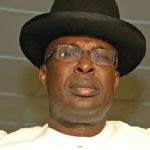Human rights lawyer and activist, Mr Dele Farotimi, has decried what he described as “the decline of the Nigerian state” and therefore stressed the urgent need for unity, ideological clarity, and citizen-led action.
Farotimi, who is the General Secretary of Afenifere, also noted that the present Nigeria state is worse than it was during the 1993 military era.
He noted that the administration of President Bola Ahmed Tinubu has faced growing criticism over its treatment of free speech and public dissent, adding that since taking office in May 2023, there have been multiple reports of actions perceived as suppression of free speech, limiting dissent, and curtailing protesters’ activities.
Farotimi said that the government’s approach to public protests, media freedom, and civil liberties has raised alarm among human rights organisations, journalists, and activists, stressing that journalists critical of the government have faced intimidation, harassment, and arrests while some media houses that report critically on the government have been subjected to threats and legal actions.
Speaking at a public symposium titled “Afenifere: Identity, Ideas and Ideology,” at the Muson Centre in Onikan, Lagos State, organised to commemorate the 97th posthumous birthday of Chief Ayo Adebanjo, Farotimi particularly criticised the centralist tendencies that have plagued Nigeria’s political structure, saying that what we have today is a one-size-fits-all system, imposed by the centre.
He noted the systematic destruction of institutions that once gave citizens a voice, stressing that every platform that could empower the people has been systematically dismantled. Farotimi however said that Afenifere still has a role to play, if there is to be a future for Nigeria, stressing that the pan-Yoruba organisation must be at the forefront of challenging the current system that has erased the place of the citizen and undermined the rule of law.
In his words; “With the judicial system compromised, and the law rendered meaningless, the lives of all Nigerians—whether Yoruba, Igbo, Fulani, or Ijaw—have been devalued.
“We live in a country where armed groups are referred to as ‘hunters,’ and yet no one knows who or what they are hunting. Citizens sleep with one eye open—or don’t sleep at all—because the state has failed in its most basic duty: the protection of lives and property.
“The constitution is ignored at will, and governance is marked by illegitimacy and arbitrariness. Instead of allowing the diverse nations within Nigeria to flourish, there is a unitary arrangement masquerading as federalism which has stifled development and made life nearly unbearable for many Nigerians.
“Issues of centralisation, calls for separation, and debates around federalism were already alive. Federalism, championed by Chief Obafemi Awolowo and the Action Group, was the middle ground,” he said.
Drawing a historical parallel, Farotimi referenced the 1993 political crisis following the annulment of the presidential election, saying that after General Abacha took power on November 17, 1993, Nigerians across the country were aggrieved and different groups had different complaints.
He noted that Afenifere served as the binding force—leading the formation of NADECO and pushing back against military tyranny.
In his words; “Today, the situation is even worse. In 2023, just like in 1993, the will of the people has been disregarded, and that puts the very foundation of society at risk.
“Afenifere’s duty is to awaken Nigerians to the common nature of their suffering and help forge a united front. If we allow ourselves to be distracted and divided, we lose our ability to seek freedom.
“Those who benefit from our disunity do so by diminishing not just our civic rights but our humanity. Afenifere must now offer a platform for all Nigerians—regardless of ethnic background—to come together. It was never founded for the Yoruba alone but for all Nigerians. It was founded to save us from ourselves.
“I still hear Baba’s voice telling us: ‘Go and organise yourselves.’ He never stopped calling for unity and self-organisation. Today, we honour him not just in words but through action. What we do with his legacy is now in our hands.”
“Afenifere is extending a hand to all Nigerians—to work with us, to find common ground and purpose, so that we may save ourselves from the crises that engulf us. This situation is not desirable—but it is not irreversible,” he added.
Farotimi further said that the Tinubu government has also used security forces to suppress public protests, stressing that demonstrations against various government policies, such as the removal of fuel subsidies, have been met with forceful dispersals by the police or military.
He said; “Protesters have been arrested, and in some instances, violence was used to break up gatherings.
“One example of this crackdown occurred during nationwide protests against the removal of fuel subsidies, which significantly raised the price of petrol. Security forces were deployed to disperse crowds, and several arrests were made,” he said.










